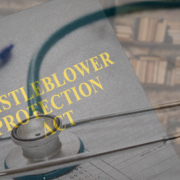What to Do If You’re a Whistleblower Facing Workplace Retaliation
Deciding to report safety concerns, discrimination, or other workplace issues is the right choice—but it may not always feel that way. Too many employers turn to retaliation when one of their employees reports concerns or assists in an investigation. Use these tips to help you as you explore your next steps. If you feel like your job is at risk in Mobile, AL, we’re here to help. Call Coumanis & York at 251-336-3491 to set up a consultation with our employment law team now.
Verify That What You’re Experiencing is Retaliation
First, you have to verify that what you’re going through is retaliation under the law. There are several components to any retaliation claim. The first is that you participated in a protected activity. Protected activities include reporting misconduct to a supervisor or manager, reporting misconduct to a government agency, cooperating with an investigating agency, or being a witness for another employee’s outside report. There are numerous laws in place that protect employees like you, and the activity that preceded the retaliation is important.
For an employer’s actions to be considered retaliation, they must have known that you engaged in a protected activity. For example, if you reported them to OSHA for a safety issue but they never found out about it, any mistreatment wouldn’t be retaliation; it would likely just be poor management. But if they knew or suspected that you turned them in and then took action against you, that would be retaliation.
You also want to narrow down what type of retaliation you experienced. Any adverse employment action can generally be considered retaliation, but a lot depends on the type of law that protects you and your specific type of protected activity. Adverse employment actions include termination, loss of hours, isolation in the workplace, and unwarranted disciplinary action that limits your future at the company.
The final component of retaliation is that the action taken against you must be caused by your protected activity. Consider this scenario: an employee reports a safety issue to OSHA and tells their supervisor that they reported the company. The employee is terminated at some point after that conversation.
That satisfies the first three components. However, in this scenario, the employee made a critical error in between informing their supervisor of their report and their termination. The company’s protocols listed this error as one that leads to immediate termination. With this additional information, the company may not have engaged in retaliation; they would have a strong case that their choice to fire the employee was due to their fireable offense, not their OSHA report.
Document, Document, Document
If you believe you are experiencing retaliation, document everything. If you think something is too small or unimportant to warrant documentation, write it down anyway. Even small things can add up to a pattern of behavior that showcases your company’s actions against you. In your documentation, indicate the date, time, who was involved, and anyone who may have observed the interaction.
You can also collect outside documentation, including emails, written reports, write-ups, or other communications from your supervisor. You may think that no employer would ever put something in writing that links them to retaliation, but a surprising amount of managers do not know their employees’ rights or their own obligations after an employee engages in protected activity.
Talk to an Attorney
The earlier you talk to a workplace retaliation attorney, the better off you are and the less work you have to do on your own. Your attorney will know which laws cover your protected activity, how to document your retaliation, and what your options are as a victim. A whistleblower protection attorney can take steps to protect your job and your future in your career. The longer you wait to reach out to a lawyer, the more likely it is that you’ll accidentally forget to document something important or do something to damage your case.
Facing Workplace Retaliation? Contact Coumanis & York Now
If you’ve been targeted by your employer for being a whistleblower, it’s time to fight for your rights and hold them accountable. Our team of Mobile, AL attorneys is here to help you. Give us a call at 251-336-3491 or connect with us online to set up a consultation with our team right away.










Leave a Reply
Want to join the discussion?Feel free to contribute!